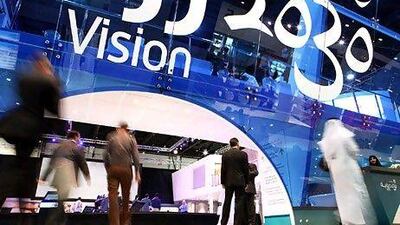Almost four years on from the sharp fall in property prices across the Emirates, industry executives have been pondering when it will reach the bottom.
That time may have come, according to investors at this week's Cityscape property exhibition in the capital. The glitzy models and overflowing car parks of four years ago are long gone. So, too, are the queues of eager investors waiting to slap deposits down on the next big thing.
But there is at least some confidence in a growing number of prime property markets across the country - high-end villas, premium office space and well-located logistics parks within free zones - to name three.
"I do believe we've reached the bottom and we are seeing the market gather momentum," said Rohan Marwaha, the managing director of Cityscape, who has been with the show since its inception a decade ago in a small ballroom in Dubai's Emirates Towers. Since then it has become an international brand stretching from Dubai to Shanghai.
He has witnessed the peaks and troughs of a market where speculators made and lost billions of dollars during a six-year boom that came to an abrupt halt in the third quarter of 2008 - leaving half-finished buildings scattered around the country and banks with balance sheets weakened by bad loans.
"People forget that real estate was affected globally - in the US the drop-off was upwards of 70 per cent in some areas," he said.
Perhaps the strongest evidence of the changing fortunes of the property industry emerged not from Cityscape in Abu Dhabi yesterday - but from the Capital Club in the Dubai International Finance Centre, its financial hub, where a new property fund targeting Dh1 billion (US$3.67bn) in assets was launched.
The National Bank of Abu Dhabi (NBAD) created the fund to lure international institutional investment in high-quality commercial property underpinned by strong rental revenue streams and covenants. The aim is to take it public.
"This fund reflects NBAD's positive outlook on the prospects of the UAE real estate sector," the bank said.
The property investment market also received a boost this month when Precinct 6, the Dubai building that is home to Rothschild and UBS, was sold for about $200 million.
Such deals, while rare, are baby steps in the progression of a property market still emerging from its speculative birth pangs - where transactions reflect real underlying demand rather than short-term, leveraged profiteering.
But the lack of big investment deals in the office segment and the drastically different fortunes of the country's various residential markets makes it difficult to take an accurate pulse of the industry.
It also makes it difficult to call the bottom, says Joseph Morris, an associate director in the investment team of Knight Frank - an international property consultant advising NBAD on its new fund.
"The market is so patchy now. Gone are the days when you can say Dubai real estate is up or down," he said. "The market is matured and it's tiered, and the view is that for prime [properties] we have definitely seen the bottom."
A slew of broker data released in the run up to Cityscape paints a picture of increasing supply across both residential and offices markets across the country, but of stabilising pricing in some prime markets.
Tenants in the capital are enjoying the benefits of that increased supply as a flood of new homes and offices has knocked Abu Dhabi landlords off their perch.
Average residential rents in the capital fell 18 per cent in the first quarter compared with a year earlier, according to CBRE data. That represented a 3.5 per cent decline from the previous quarter. New apartment blocks along the Corniche, on Saadiyat Island and at Al Raha Beach are expected to cause a further softening in rents this year.
Jones Lang LaSalle estimates as many as 23,900 new residential units could hit the Abu Dhabi market this year, although many are likely to face handover delays. About two thirds of the expected supply are apartments, while most of the villas being delivered are within Emirati communities.
The office market has also weakened further with average rents falling 4 per cent from the previous quarter to about Dh1,350 (US$367.66) per square metre. But rents for prime office space remained stable. Such figures may sap the fizz from property shows such as Cityscape, but the mood may not be quite as bleak as in previous years. Investor expectations of the returns offered by property in the Emirates has also changed.
Back in Dubai's Capital Club, Zain Abdullah, the senior executive officer of NBAD's new property fund in the DIFC, says calling the bottom of the market may not be as important as identifying which parts of it are generating income.
"The bottom is relative. The important thing is that certain areas are offering value and income right now," he said. "Now investors are coming here for less reward but also for less risk."

